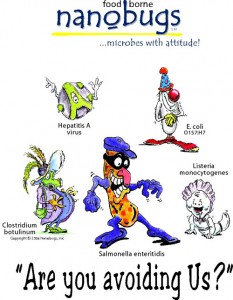08 Feb Reusable Grocery Shopping Bags
A few words about reusable shopping bags:
Reusable shopping bags are promoted to help us reduce waste, but they are not always food safe. The fabric or materials used in these bags can become contaminated with nanobugs like Salmonella enteritidis or E. coli or Listeria monocytogenes from the food they touched. The bags accumulate nanobugs and then contaminate other food items that are put in the bag on the next shopping trip. The bags can also cross contaminate kitchen countertops with microbes collected from the ride home on the floor or the trunk of the car. Always clean kitchen countertops after unloading groceries.
Here are some tips for managing shopping bags and isolating the nanobugs:
1. Choose bags that can be washed and wash them regularly (once a month) or whenever they are obviously contaminated with meat juices, broken eggs, and wet messes.
2. Avoid wet messes by separately bagging raw meats in disposable plastic bags at the check-out. (If your grocery doesn’t routinely offer them –make a request or take your own) These disposable bags can be reused for “dirty duties” like picking up dog waste when you walk the dog or for sifted cat waste when cleaning the litter box)
3. Separate ready-to-eat foods from fresh produce and meats and eggs in separate bags. This is sometimes easier if you shop at a store that allows you to bag your own groceries. Otherwise, help teach and train the carry-out employees in this aspect of food safety.
4. If you use or supplement with paper or plastic bags, use them for garbage or recycle them. Some small stores or coops offer used cardboard boxes that can be used instead of bags or to hold bags upright in the trunk. These can be used in the garage or the yard to collect weeds, etc.







Sorry, the comment form is closed at this time.